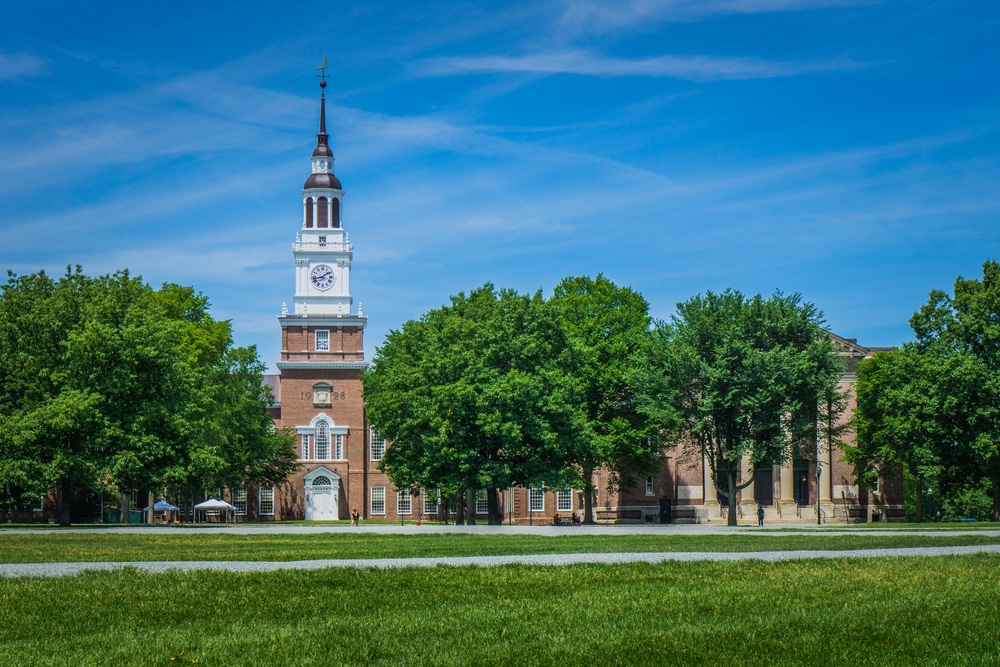Dartmouth Endowment
The financial health of institutions, particularly universities, can be gauged through the size and management of its endowment. Dartmouth College, as one of the prestigious Ivy League schools, boasts a considerable endowment worth exploring. In this article, we delve into Dartmouth’s financial backbone, its endowment, its history, its structure, its comparison to other schools, and its essential impact on the university’s operations.
Understanding Endowments: A Brief Overview
Before diving into Dartmouth’s specifics, it’s important to establish a fundamental understanding of what an endowment is and why it matters. At its most basic level, an endowment is a financial instrument that universities use to draw on for support. It is primarily funded through donations and is invested in various assets to generate additional income.
The Purpose and Importance of University Endowments
Endowments serve several purposes. Primarily, they exist to provide universities with a steady and sustainable flow of funding. This supplemental income is especially crucial in times of budgetary constraints or unexpected expenses. Additionally, endowments can also earmark funds for specific purposes, such as scholarships, research, professorships, and facilities maintenance.
Having a sizable endowment not only ensures financial stability but also enhances the institution’s reputation. A robust financial standing attracts potential students and faculty, and typically indicates a rich history of alumni involvement and generous benefactors.
Furthermore, university endowments play a significant role in supporting the institution’s long-term goals and strategic initiatives. They provide the necessary resources to invest in cutting-edge research, develop innovative programs, and create a vibrant campus environment that fosters intellectual growth and personal development.
Moreover, endowments can also act as a buffer against economic downturns or fluctuations in government funding. By having a diversified investment portfolio, universities can mitigate financial risks and ensure the continuity of their operations, even during challenging times.
How Endowments Work: A Basic Explanation
University endowments are not merely storage for donated funds. These endowment funds are typically invested with a long-term perspective, aimed at generating ongoing income while preserving the principal amount.
Endowments are managed by a team of investment professionals who carefully allocate the funds across various asset classes, such as stocks, bonds, real estate, and alternative investments. This diversified approach helps to minimize risk and maximize returns over time.
It is a rule of thumb that colleges and universities spend about 5% of their endowment’s total value each year on their institutional budget, ensuring that the fund continues to grow and support future generations.
Furthermore, the investment earnings generated by the endowment are reinvested, allowing the fund to grow over time. This compounding effect ensures that the endowment’s purchasing power remains strong and enables the institution to maintain its financial stability in the face of inflation and rising costs.
It’s worth noting that endowments are subject to strict governance and oversight to ensure transparency, accountability, and responsible financial management. Universities often establish committees or boards to oversee the management and distribution of endowment funds, ensuring that they are used in accordance with the institution’s mission and objectives.
The History of Dartmouth’s Endowment
Dartmouth’s endowment has a much-storied past, dating back to the university’s founding.
The story of Dartmouth’s endowment begins in 1769 when Dartmouth College was established. At its inception, the endowment started from modest beginnings, relying on generous donations from early benefactors who believed in the mission and vision of the college. These initial contributions laid the groundwork for what would become a crucial financial resource for Dartmouth’s growth and development.
As the years went by, Dartmouth’s endowment saw steady growth, thanks to disciplined investment strategies and the continued support of its alumni. The endowment became a vital source of funding, providing resources that underpin every aspect of the university’s operations. From faculty salaries and student scholarships to campus infrastructure and academic programs, the endowment played a pivotal role in shaping Dartmouth into the prestigious institution it is today.
The Initial Establishment and Growth
Dartmouth College was established in 1769, and its endowment started from modest beginnings. With generous donations from early benefactors, the endowment grew steadily and played a vital role in the college’s development.
Over the decades, disciplined investment strategies and generous alumni have allowed Dartmouth’s endowment to thrive, providing resources that underpin every aspect of the university’s operations.
Throughout its history, Dartmouth’s endowment has faced various challenges and fluctuations in the market. However, the college’s commitment to prudent financial management and long-term investment strategies has helped it weather economic storms and maintain a strong financial position.
One of the key factors contributing to the growth of Dartmouth’s endowment is the dedication and support of its alumni community. Dartmouth alumni have consistently demonstrated their commitment to the college by making significant contributions to the endowment. These donations have not only provided immediate financial support but have also created a culture of giving that continues to benefit future generations of students.
Significant Milestones in Dartmouth’s Endowment History
The growth of Dartmouth’s endowment has been marked by significant milestones. One noteworthy instance was in the late 20th century when a series of transformations in institutional strategies led to a notable endowment upswing.
During this period, Dartmouth College implemented innovative investment approaches and diversified its portfolio, resulting in substantial growth of the endowment. These strategic decisions allowed the college to adapt to changing market conditions and capitalize on emerging investment opportunities.
This growth has underpinned Dartmouth’s standing among other Ivy League institutions and has laid a solid financial foundation for its future.
Today, Dartmouth’s endowment stands as a testament to the enduring support and commitment of its community. It continues to provide the necessary resources to attract top-tier faculty, support groundbreaking research, and offer transformative educational experiences to students from all walks of life.
As Dartmouth College looks to the future, the endowment will undoubtedly play a vital role in ensuring the institution’s continued excellence and impact on the world.
The Structure of Dartmouth’s Endowment
Navigating the inner workings of Dartmouth’s endowment can be complex. It requires a deep understanding of firm investment principles and strategic allocation practices.
When it comes to managing Dartmouth’s endowment, the responsibility falls on the capable shoulders of the Dartmouth College Investment Office. This dedicated team is tasked with defining the investment strategy, making crucial decision-making, and aligning the endowment’s initiatives with the college’s long-term financial objectives.
With a commitment to excellence, the Investment Office persistently monitors the performance of investments. This involves analyzing market trends, evaluating risk factors, and making modifications as needed to maintain a diversified and productive portfolio. Their expertise and attention to detail ensure that Dartmouth’s endowment remains robust and capable of supporting the college’s mission.
The Role of the Investment Office
The Dartmouth College Investment Office plays a pivotal role in the success of the institution’s endowment. They are not simply passive observers but active participants in the financial well-being of the college. By carefully crafting an investment strategy that aligns with Dartmouth’s values and goals, they contribute to the overall growth and stability of the endowment.
One of the key responsibilities of the Investment Office is to identify and evaluate potential investment opportunities. This involves conducting thorough research, analyzing market trends, and assessing risk factors. By staying informed and proactive, they are able to make informed decisions that maximize returns while minimizing risk.
In addition to managing the investment portfolio, the Investment Office also oversees the distribution of funds. They work closely with various departments and stakeholders to ensure that the endowment’s resources are allocated effectively. This includes providing financial aid to deserving students, supporting faculty and academic programs, and covering operational costs and infrastructure maintenance.
Allocation of Funds: Where the Money Goes
For Dartmouth, maintaining a healthy endowment means continually reevaluating where funds are most effectively utilized. The Investment Office, in collaboration with college leadership, carefully allocates the endowment’s resources to support the various needs of the institution.
A significant portion of Dartmouth’s endowment is committed to providing financial aid. This commitment reflects the college’s dedication to ensuring access and affordability for all students, regardless of their financial background. By investing in financial aid programs, Dartmouth can attract a diverse and talented student body, fostering a vibrant and inclusive community.
Another significant proportion of the endowment supports faculty and academics. This includes funding research initiatives, creating endowed professorships, and supporting innovative teaching methods. By investing in the intellectual capital of the college, Dartmouth can attract and retain top-tier faculty members who excel in their respective fields.
While supporting students and faculty is essential, the endowment also covers operational costs and upkeep of the campus infrastructure. This includes maintaining and improving facilities, investing in technology and resources, and ensuring a safe and conducive learning environment for all members of the Dartmouth community.
By strategically allocating funds across these different areas, Dartmouth’s endowment plays a vital role in sustaining the college’s mission and ensuring its long-term success.
Dartmouth’s Endowment in Comparison
In comparison to its Ivy League counterparts and across the national landscape, Dartmouth’s endowment stands as a testament to its financial stability and sustainability.
Dartmouth College, located in Hanover, New Hampshire, is renowned for its exceptional academic programs and commitment to providing a well-rounded education to its students. One aspect that sets Dartmouth apart from its Ivy League peers is its endowment, which plays a crucial role in supporting the college’s mission of excellence in teaching, research, and service.
Comparing Dartmouth’s Endowment to Other Ivy League Schools
While Dartmouth’s endowment might not be the largest among Ivy League schools, it has a reputation for wise management and stable growth. With an endowment valued at over $6 billion, Dartmouth ensures that its students have access to world-class resources and opportunities.
When comparing Dartmouth’s endowment to larger colleges such as Harvard and Yale, it is important to consider the size of the student body. Dartmouth’s endowment per student holds its own, reflecting the college’s commitment to providing abundant resources for its students. This commitment is evident in the state-of-the-art facilities, cutting-edge research opportunities, and generous financial aid packages that Dartmouth offers to its students.
Furthermore, Dartmouth’s endowment is strategically managed to support the college’s long-term goals. The investment team at Dartmouth takes a disciplined approach, diversifying the endowment’s portfolio to mitigate risks and maximize returns. This prudent management ensures that the endowment continues to grow steadily, providing a stable financial foundation for the college.
Dartmouth’s Endowment in the National Context
Nationally, Dartmouth’s endowment is one of the largest in the country. This financial strength not only helps Dartmouth maintain its top-tier standing among higher education institutions but also provides the means for the college to continue pushing boundaries in education, research, and community service.
The substantial resources provided by Dartmouth’s endowment enable the college to attract and retain exceptional faculty members who are leaders in their respective fields. These faculty members, in turn, inspire and mentor students, fostering a vibrant intellectual community on campus.
In addition to supporting academic programs, Dartmouth’s endowment plays a crucial role in funding groundbreaking research initiatives. From exploring innovative solutions to global challenges to advancing scientific discoveries, Dartmouth’s research endeavors have a far-reaching impact on society.
Furthermore, Dartmouth’s commitment to community service is amplified by its robust endowment. The college actively engages with local communities, addressing societal issues through various outreach programs and initiatives. The financial resources provided by the endowment empower Dartmouth students and faculty to make a positive difference in the world.
Overall, Dartmouth’s endowment, though not the largest in the Ivy League, is a testament to the college’s financial stability and commitment to excellence. With its prudent management, Dartmouth ensures that its students have access to abundant resources, while its national standing allows the college to continue pushing boundaries in education, research, and community service.
The Impact of Dartmouth’s Endowment on the University
The influence and utility of Dartmouth’s endowment can’t be overstated. It touches virtually every aspect of life on campus.
Funding Opportunities Provided by the Endowment
One of Dartmouth’s core missions is to ensure the accessibility of a top-tier education to all admitted students, regardless of their financial capacity. Thanks to the endowment, the college has been able to devote a significant portion of its funds to financial aid, making this mission possible.
Furthermore, through the endowment, Dartmouth sustains cutting-edge research projects, offers competitive faculty salaries, and ensures the maintenance and enhancement of campus facilities.
The Endowment’s Influence on Tuition and Financial Aid
One of the most visible impacts of Dartmouth’s endowment on the day-to-day experience of students is tuition pricing and financial aid availability. Tuition fees are moderated due to the income Dartmouth derives from its endowment, making the costs more manageable for students and their families. Simultaneously, generous financial aid packages, also funded by the endowment, ease the burden further.
Dartmouth’s endowment is a pivotal element of the university’s financial stability and commitment to its students and faculty. Ensuring its continued growth and efficient use is a significant focus for Dartmouth’s future.
How AdmissionSight Can Help You with College Admissions
AdmissionSight is a college consulting firm that provides personalized assistance to students throughout the college admissions process. Here are some ways that AdmissionSight can help you:
Admissions strategy: AdmissionSight can help you develop a strategic plan for your college application process. Our professional consultants can assist with identifying schools that are a good fit for your academic, extracurricular, and personal goals and help you plan and prioritize your application strategy.
Application review: AdmissionSight can review your application and provide feedback on how to improve it. We can offer suggestions on making your application stand out and highlighting your strengths and unique qualities.
Essay coaching: AdmissionSight can help you craft compelling essays that showcase your personality, goals, and achievements. We can guide you through the essay writing process and provide feedback on your drafts to help you refine your writing.
Interview preparation: AdmissionSight can provide interview coaching to help you feel confident and prepared for college interviews. Our experts can offer tips on how to present yourself professionally and how to answer common interview questions.
Extracurricular planning: AdmissionSight can help you plan and develop your extracurricular activities to make them more impactful and meaningful. We can suggest activities that align with your interests and goals and provide guidance on demonstrating your leadership and initiative.
Overall, AdmissionSight can provide valuable guidance and support throughout the college admissions process to help you maximize your chances of getting accepted into the college of your choice.
With a high success rate of over 75%, we have built a strong network in the past decade. Book an initial consultation today, free of charge!









































